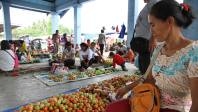Marhay na Aga sa Indo Gabos (Good morning to everyone!)
Almost two years ago, we had consultations with officials of national government agencies and local government units, civil society, private sector, and development partners as part of our preparations for the drafting of our new Country Partnership Strategy or CPS.
Today, I am happy to let you know that we have finalized the CPS, the document that guides the World Bank Group’s operations in the Philippines from 2015 to 2018. It was endorsed by our Board on Executive Directors on June 12 this year.
The CPS was developed after a long consultative process. I am happy to say that, as a result, we have been able to sharpen the strategy to support the Government’s own development goals of inclusive growth as well as to reflect the Bank’s twin goals of eliminating extreme poverty and boosting shared prosperity.
Under the CPS, we will focus on areas with highest poverty incidence, where the magnitude of poverty is severe or in areas with high vulnerability. We will support programs and projects that are transformational, or those whose impact are far-reaching in terms of reducing poverty. This is the same reason why we have maintained the theme “Making Growth Work for the Poor” from our previous assistance strategy.
Currently, Bicol region is benefitting from projects that are being implemented nationwide by the government with support from the World Bank.
About 360,000 households are beneficiaries of the Pantawid Pamilya, which provides incentives to poor families to let their children stay in school and become healthy. About a million children in the Bicol region are enrolled in the program.
Under the Philippine Rural Development Project (PRDP), the Department of Agriculture (DA) has earmarked P1.12 billion for farm-to-market roads and bridges in the Region, on top of the livelihood projects that are slated for implementation to benefit farmers and fisherfolk. PRDP aims to raise rural incomes and reduce poverty.
The National Community Driven Development Project (NCDDP) that empowers communities to have a voice in the design and implementation of projects that address their common challenges also prioritizes the Bicol Region.
And of course, Bicol is also one of the priority regions for the implementation of LEAPS or Learning, Equity and Accountability Support Project), a new nationwide project designed to improve the basic skills of students in reading and mathematics.
I know that Bicol Region is one of the areas hit hard by natural disasters. Like many regions in the country today, you also suffer from floods, typhoons, and other calamities. Hence, climate change, environment, and improved disaster risk management is one of the engagement areas we are keen to work on with our partners in government and other stakeholders.
Our work on climate change and disaster risk management is highly relevant to the region as it is to most parts of the country. And I’m happy to note that we have in our midst the Province of Albay as one of the leaders in climate change adaptation and disaster risk management. We can learn a lot from the experience of the province in making sure the poor and most vulnerable are resilient and less vulnerable to the impact of climate change and natural disasters.
Sharing with you the CPS is only one of the reasons why we are gathered here today. The more important reason is: we want to hear and learn from you what aspects of the CPS we should focus on in the next 18 months so we can help strengthen the fight against poverty.
But before we go into that, please allow me to share with you the context of what we are trying to achieve in the next few years and beyond.
For the first time in seven decades, the economy has managed to sustain higher growth for over a decade now. This allowed the Philippines to double per capita income in just 7 years (from USD 1,660 to 3,270).
For the first time in 7 decades, the country’s inflation has generally been low and stable at less than 5 percent, allowing businesses and households to raise real income.
For the first time in 7 decades, the country has managed to lower debt-to-GDP ratio below 50 percent from over 100 percent in 2003. This allowed the government to double social services spending in the last 4 years, with strong impact on poverty.
And Bicol itself has been doing remarkably well in the last several years. The latest figure (released in July 14 this year) from the Philippine Statistical Authority shows that the region is the top performer in 2012-013, growing at 9.4 percent from 6.9 in the previous year. Services and the industry sectors were the leading contributors.
We will be implementing together the CPS in a very fast-changing political environment. In May 2016, for instance, the country will hold the presidential election. Important developments like these will bring a lot of changes.
For reformers in this country, the question is how to navigate through these dynamics to continue to build support for pro-poor, pro-inclusive growth policies, programs and projects. So today, we are asking you the following questions:
o What are the 2-3 critical reforms, programs and projects that you would like to see being strengthened or institutionalized in the next 18 months? Why? How could these be strengthened or institutionalized?
o What are the risks to achieving these and how can these be managed?
o How do you see the WBG and/or your sector or stakeholder group contributing to achieve these milestones?
Once again, thank you for participating in this dialogue. I urge you to be candid in your views so we can have a very productive interaction. The CPS has benefitted from your inputs and we will continue to listen and work with you and other stakeholders in implementing the CPS. Partnership and collaboration will be key in achieving impact and sustaining results.
Thank you!

